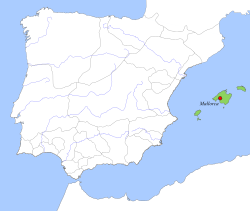1113–1115 Balearic Islands expedition
| 1113–1115 Balearic Islands expedition | |||||||
|---|---|---|---|---|---|---|---|
| Part of the Crusades | |||||||
 The taifa of the Balearics (green), with its capital (Mallorca), the Crusaders' chief target, indicated. |
|||||||
|
|||||||
| Belligerents | |||||||
|
Republic of Pisa Catalan counties County of Provence Giudicato of Torres Papal States |
Taifa of Majorca Almoravids |
||||||
| Commanders and leaders | |||||||
|
Pietro Moriconi Ramon Berenguer III of Barcelona Hug II of Empúries Saltaro of Torres |
Abu-I-Rabi Sulayman (POW) | ||||||
| Strength | |||||||
| 300 Pisan ships 150 Catalan and Provençal ships |
Unknown | ||||||
| Casualties and losses | |||||||
| Unknown | High | ||||||
In 1114, an expedition to the Balearic Islands, then a Muslim taifa, was launched in the form of a Crusade. Founded on a treaty of 1113 between the Republic of Pisa and Ramon Berenguer III, Count of Barcelona, the expedition had the support of Pope Paschal II and the participation of many lords of Catalonia and Occitania, as well as contingents from northern and central Italy, Sardinia, and Corsica. The Crusaders were perhaps inspired by the Norwegian king Sigurd I's attack on Formentera in 1108 or 1109 during the Norwegian Crusade. The expedition ended in 1115 in the conquest of the Balearics, but only until the next year. The main source for the event is the Pisan Liber maiolichinus, completed by 1125.
In 1085 Pope Gregory VII had granted suzerainty over the Balearics to Pisa. In September 1113 a Pisan fleet making an expedition to Majorca was put off course by a storm and ended up near Blanes on the coast of Catalonia, which they initially mistook for the Balearics. The Pisans met with the Count of Barcelona in the port of Sant Feliu de Guíxols, where on 7 September they signed a treaty causa corroborandae societatis et amicitiae ("for the cause of social cooperation and friendship"). Specifically the Pisans were exempted from the usagium and the jus naufragii in all the territories, present and future, of the Count of Barcelona, though Arles and Saint-Gilles, in the recently acquired March of Provence, were singled out for special mention (three times).
...
Wikipedia
